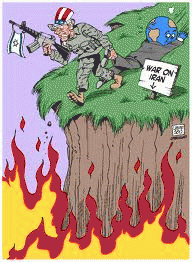Now that the talks with Iran on its nuclear program appear to be on the ropes, are we on the road to war? The Israelis threaten it almost weekly, and the Obama administration has reportedly drawn up an attack plan. But in a sense, we are already at war with Iran.
Carl von Clausewitz, the great theoretician of modern warfare, defined war as the continuation of politics by other means. In the case of Iran, international politics has become a de-facto state of war.
According to reports, the annual inflation rate in Iran is 22.2 percent, although many economists estimate it at double that. In the last week of June, the price of chicken rose 30 percent, grains were up 55.8 percent, fruits up 66.6 percent, and vegetables up 99.5 percent. Iran's Central Bank estimates unemployment among the young is 22.5 percent, although the Financial Times says "the official figures are vastly underestimated." The production sector is working at half its capacity.
The value of the Iranian rial has fallen 40 percent since last year, and there is a wave of business closings and bankruptcies due to rising energy costs and imports made expensive by the sanctions.
Oil exports, Iran's major source of income, have fallen 40 percent in 2012, according to the International Energy Agency, costing the country nearly $32 billion over the past year. The 27-member European Union (EU) ban on buying Iranian oil will further depress sales, and an EU withdrawal of shipping insurance will make it difficult for Tehran to ship oil and gas to its diminishing number of customers. Loss of insurance coverage could reduce Iran's oil exports by 200,000 barrels a day, or $4.5 billion a month. Energy accounts for about 80 percent of Iran's public revenues.
Whipsawed by energy sanctions, the worst may be yet to come. The United States has already made it difficult for countries to deal with Iran's Central Bank, and the U.S. Congress is considering legislation that would declare the Iranian energy sector a "zone of proliferation concern," which would strangle Tehran's ability to collect payments for its oil exports. Other proposals would essentially make it impossible to do business with Iran's other banks. Any country that dared to do so would find itself unable to conduct virtually any kind of international banking.
If the blizzard of legislation does pass, "This would be a significant ratcheting-up of the economic war against Iran," Mark Dubowitz told the Financial Times. Dubowitz is executive director of the neoconservative Foundation for the Defense of Democracies, which has lobbied for a series of economic assaults against the Palestinians, China, and Hezbollah.
But the "war" has already gone far beyond the economic sphere.
In the past two years, five Iranian nuclear scientists have been assassinated. The hits have been widely attributed to the Israeli intelligence service, Mossad, and the People's Mujahedin of Iran (MEK), an organization the U.S. State Department designates as "terrorist."
Last year a massive explosion rocked the Bid Ganeh military base near Tehran, killing 17 people, including the founder of Iran's missile program, Gen. Hassan Tehrani Moghaddam. According to Israeli media, the camp was sabotaged by the MEK working with Mossad. Deadly attacks directed at Iran's Revolutionary Guard have been tied to Jundallah, a Sunni group with ties to U.S. and Israeli intelligence.
It is no secret -- indeed, President Obama openly admitted it -- that under the code name "Olympic Games," the United States has been waging cyber war against Iran. The Stuxnet virus shut down a considerable portion of Iran's nuclear program, although it also infected infrastructure systems, including power plants, oil rigs, and water supplies. The virus was designed to attack systems made by the German company Siemens and has apparently spread to China, Pakistan, and Indonesia.
The United States is also suspected of being behind the Flame virus, a spyware program able to record keystrokes, eavesdrop on conversations near an infected computer, and tap into screen images. Besides Iran, Flame has been found in computers in the Palestinian West Bank, Lebanon, Hungary, Austria, Russia, Hong Kong, and the United Arab Emirates. Because "malware" seeks out undefended computers no matter where they are, it has a habit of spreading beyond its initial target.
Most of the media is focused on whether the failure of the talks will lead to an Israeli or American attack on Iran's nuclear facilities, and there is certainly considerable smoke out there.
Israeli Prime Minister Benjamin Netanyahu and Defense Minister Ehud Barak have been threatening to attack Iran for the past two years. According to Gideon Rachman, a leading columnist for the Financial Times, some Israeli officials have told him Tel Aviv will attack sometime this summer or early fall. One source told him "Israel will wait until September or October because the weather is better and it's closer to the U.S. elections."
But the Independent's (UK) Patrick Cockburn, one of the more reliable analysts on the Middle East, thinks the Israeli threats are "the bluff of the century." Cockburn argues that there is simply no reason for Tel Aviv to go to war, since the Iranian economy is being effectively strangled by the sanctions. But the saber rattling is useful because it scares the EU into toughing up the siege of Tehran, while also shifting the Palestinian issue to a back burner.
(Note: You can view every article as one long page if you sign up as an Advocate Member, or higher).






